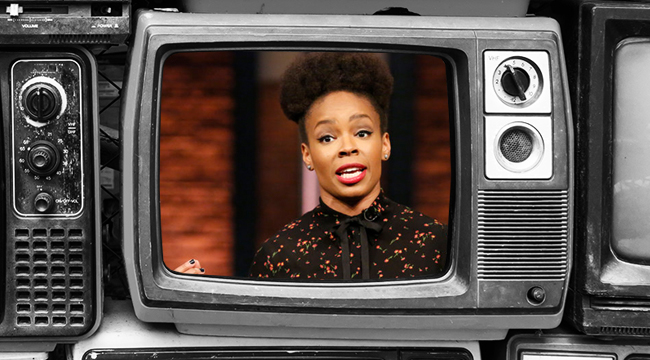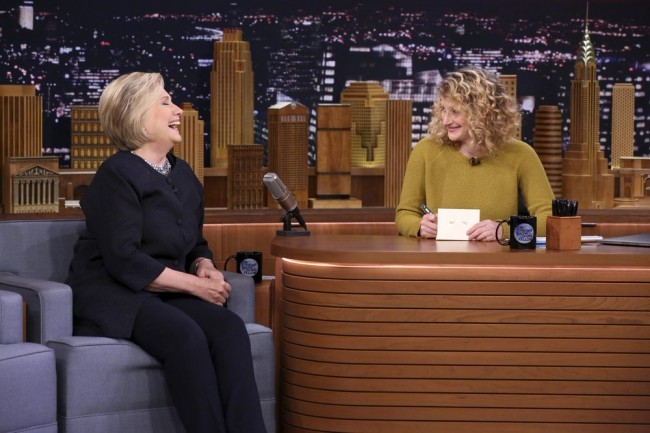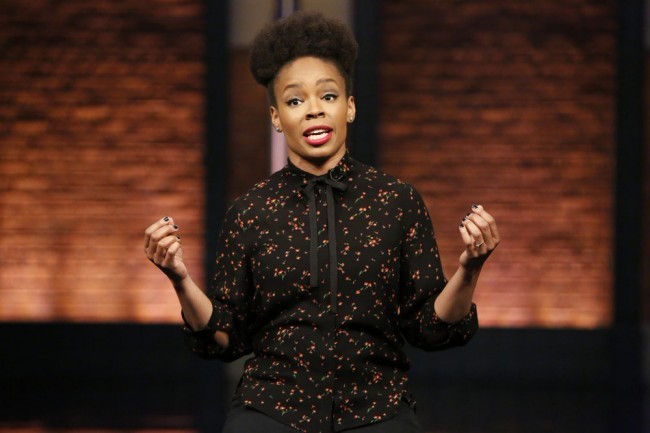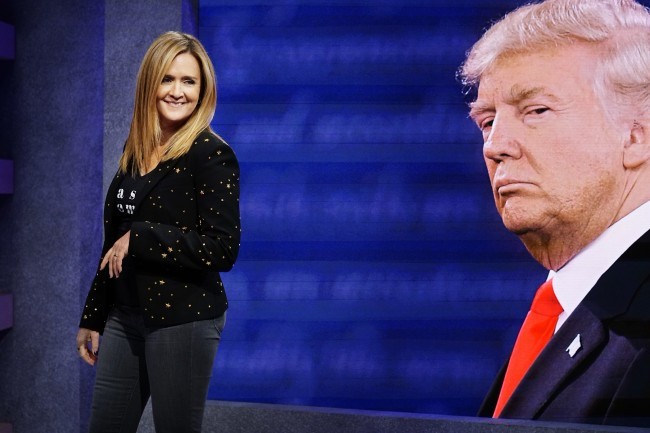
Comedy’s always been rooted in rebellion, and that’s been more evident than ever in world of late night, since the election of Donald Trump. That’s in large part been thanks to a slew of female writers and comedians finally getting their due.
It’s no secret that after-hours talk shows have historically been manned by older white men and, sadly, not much has changed when it comes to the face of late-night. They’re a bit younger, less cranky, more prone to partaking in funny sketches, and aware of the value of viral videos. But the hosts behind the desks are still mostly dudes, they’re still mostly white. And by default, that makes them unable to effectively tackle the entirety of the shitstorm this year threw at us.
Luckily, they have some talented, bitingly funny, incredibly patient women sifting through slurred presidential speeches and misogynistic health care bills to help them out. They’re not always sitting behind the desk or even appearing in front of the camera, but these women are shaping the way we view the world by cracking clever jokes, delivering exhaustingly researched tirades, and giving viewers an outlet for our anger through humor and responsible reporting.
In other words, these are the funny women in late night that Trump really shouldn’t have pissed off.
The Tonight Show Starring Jimmy Fallon

No show on late night has struggled under the unrelenting Trump news cycle quite like The Tonight Show. Just a few years ago it had seemingly found its sweet spot in likable host Jimmy Fallon and his propensity for silly sketches and pre-taped pop culture bits that seldom failed to go viral. Fallon’s good-natured enthusiasm for his celebrity guests felt genuine – hey, we’d all lose our shit over learning Nicole Kidman once carried a torch for us – and his ability to convince said guests to play along on TV, whether via a lip sync battle, a beer pong match, or a water fight — was unparalleled. But when 2017 brought a shift in our political climate it also ushered in a different kind of late-night format – one filled with rage-fueled takedowns, biting commentary, and fully-researched investigative deep dives, none of which Fallon excels at. Instead, the show has been working to find its own winning blend, a mixture of equal parts relevance and silliness in a world where the latter isn’t just in short supply, it’s now frowned upon.
“It’s that weird balance of constantly being worried and enraged and also trying to figure out how to give people the capacity to laugh again,” Tonight Show writer Albertina Rizzo tells us. “Obviously we all wish the world wasn’t this Dumpster fire that we are living in right now, but we do what we can with it.”
Rizzo, who’s been with Fallon since his Late Night days, says the shift in the tone of the show mirrors how the rest of the country is feeling right now.
“I think that a lot of us didn’t see it coming; I just think as a country we didn’t see it coming, and now I think we’re all trying to figure out what this new world is and what it means and just how bad it can get,” Rizzo says. “Also, [we’re] trying to lift people up that need it and tell stories that need to be told and give a voice to those people that are being suppressed by people like Trump.”
That’s why, instead of having Fallon spit out anger-filled monologues, they’ve chosen to occasionally poke fun at their host’s often criticized track record with the president (Fallon starred in a refreshingly self-aware clip this year titled “Trump Haunts Jimmy”), recruit fresh comedic voices to deliver the news, or take it upon themselves to get in front of the camera and talk about the serious issues.
Two of those fresh voices – Julio Torres and Patti Harrison – have been popping up on the show more and more thanks to Trump. Torres had a particularly memorable moment on the show when he appeared as a “correspondent” to discuss Trump’s position on the DREAM Act and how immigrants were supposedly stealing jobs from hard-working Americans.
If you were to ask Torres what he does for a living he’d say he’s a comedian that specializes in queer multimedia, often covers himself in glitter, and tries to find a way to work tiny shapes into his act. Not the kind of job most people covet.
“He was brilliant,” Rizzo says. “It was so funny and nuanced.”
It’s a model the show has adapted when confronting any issue that might not be best-served by Fallon covering it himself. For instance, Harrison’s commentary on Trump’s transgender military ban felt more rich and affecting because she’s a member of the LGTBQ community herself.
“The challenge is also this: we’re all reading the same news and every single late night show is dealing with the same thing,” Rizzo says. “So there’s going to be a million takes on something and our job is to find out what our take is going to be and how original we can be with that take.”
Thus, when the show had Hillary Clinton on nearly a year after the presidential election, the writers’ room decided to hijack Fallon’s “Thank You Notes” segment to spotlight some heartfelt thanks to Clinton, in the process delivering the sort of bit you don’t normally see on male-lead late night shows — one full of emotion, kindness, and sincere appreciation. With seven female writers on their team – the most of any program on late night – Fallon’s show had the rare opportunity to give a voice to women when it spotlighted its female staff and gave them leave to pour their hearts out to the former presidential candidate.
“It was something that Jimmy really encouraged and wanted us to do,” Rizzo said. “There was no other way for us to not make it heartfelt because it was, that’s the reality of it. We could’ve tried to make it a bit, but I think there was just so much weight and emotion in it for all of us.”
For Jo Firestone, another writer on The Tonight Show, the chance to sneak in strange sketches and offbeat bits to break up the unrelenting slog of bad news doesn’t just fit her self-labeled “weird” brand of comedy – before late night she was doing a handful of high-brow routines around New York – it also helps her stave off the depression of living in the Trump era.
“It’s exhausting to be so disappointed and to see such terrible things all the time,” Firestone says. “It does take a critical eye and an awareness of what people can take and how to approach it in a way that’s not just like, ‘Well, he sucks.’”
Firestone took part in the Clinton “Thank You Notes” Segment and her fellow writers Jasmine Pierce and Taryn Engelhart, crafted a Jessica Chastain-starring bit about sexual harassment following the Harvey Weinstein scandal.
“You didn’t see any men in that sketch, which was awesome,” Firestone says. “You only heard Jimmy playing a pervert off-screen and you just get to see the reaction of this poor woman’s face while she’s dealing with this situation and trying to deal with it as gracefully as possible and it’s like every woman I know has been in a situation like that. It’s just cool there’s space on the show for it.”
The show also gives Firestone and Rizzo a national platform to target behaviors and archaic systems they’ve been victims of because of their gender.
“Every female comedian I know works and works and works, and just kind of hustles all the time,” Firestone says. “There is still backlash from audiences, there is still backlash from other comics. In order to be a comedian, you just have to be okay with rejection and as a female comedian, there is even more. Anyone coming from a non-white straight man’s perspective is going to have a difficult road for comedy. It’s going be met with more resistance because people have antiquated ideas of what it means to be a comedian. There’s this ageism and racism and sexism within the scene, and trying to push through that takes a lot of… I don’t know what it takes, but it takes a lot of it.”
If anything, The Tonight Show’s writing team is proving it doesn’t need to rely on white men to deliver the news and make people laugh and it doesn’t have to constantly bombard us with the shitty reality of the world. There’s a balance that can be struck and these women are hell-bent on finding it, if not for their own sanity, then for ours.
Late Night With Seth Meyers

Jimmy Fallon and Seth Meyers share a similar background. Both rose through the ranks on Saturday Night Live before landing their own talk shows on NBC. But where Fallon specializes in cartoonish impressions and sketch characters, Meyer’s time manning the Weekend Update desk solo has prepared him to deliver some of the year’s most scathing diatribes against Trump and the GOP.
Meyers has consistently cut the president down to size in his “A Closer Look” segments and the show has emerged as an important critical voice in late night, thanks to its writing team which includes comedians like Jenny Hagel and Amber Ruffin. The two women often join Meyers in front of the camera in bits like “Jokes Seth Can’t Tell” and “Amber Says What” to offer their own perspectives on the news while cheekily acknowledging the privilege that keeps the show’s host from cracking the same jokes.
“Sometimes the most effective way to address it is to have somebody who is affected by it address it,” Hagel tells us about the genesis of their popular bit. “So it’s not about bypassing Seth, but it’s about what’s the best vehicle for this thing we want to say in the show.”
But if you’re imagining the writers create these segments to, as Hagel mockingly jokes, “give a voice to the voiceless,” the truth of how late-night television works might have you a bit disillusioned.
“It’s more like, ‘Oh shit, we have something due Thursday,’” Hagel says, recalling the origin of “Jokes Seth Can’t Tell.” “We brought it into one of our weekly sketch meetings, and honestly, to our surprise, it was approved. But I think we also thought, ‘Oh, we’ll do this one time, and this will be a fun one-off thing,’ and we were very surprised by the response. Pleasantly surprised.”
The unexpected reception to that segment, more than anything else, proves why giving women a voice in late night is so key. For Ruffin and Hagel, those jokes that their host can’t tell are usually born from real-life ranting over a few margaritas after work.
“I just went off on how sexist I thought the coverage of the presidential election was, and I just kept getting louder and louder and finally [Amber] was like, ‘You need to write about that for tomorrow,’” Hagel says. “When you have a real fire in your belly about something that usually means you have a pretty clear point of view. That always leads to strong writing.”
Ruffin follows the same rule.
“If I can’t talk about it without yelling, it’s probably something I should talk about on the show.”
But that doesn’t mean either of them feel required to speak on every issue that affects them as members of marginalized communities.
“I don’t feel obligated to do anything,” Ruffin says. “I’m a black lady. My victory is getting up in the morning. If I do that, I’ve already won.”
They do however feel a responsibility to do justice to things that they feel passionate about, whether it’s the Colin Kaepernick controversy or the Kevin Spacey sexual assault allegations – both hot-button issues the comedians individually covered in original ways.
In Ruffin’s case, her segment about football players kneeling during the national anthem perfectly represented her brand of comedy.
“I really liked when people were getting mad about football players taking a knee, and I came out and I did a bit that was like,’ I just want to say, I’m in solidarity with those football players,’ and then I took one knee, and I was like, ‘Oh no, is this right?’ And Seth was like, ‘I don’t know.’ And I was like ‘Oh God.’ Then I tried laying on the floor, like ‘Is that right?’ And he’s like, ‘That’s planking,’” Ruffin explains. “To me, that was my favorite. Like, this is a very shitty topic, but on the other hand, fart noises, you know? Which is my favorite place to be.”
While 2017 certainly shifted the tone of late night – there’s less room for jokes about dog mayors in Minnesota — things like discrimination, sexism, and racism aren’t just issues Hagel and Ruffin are assigned to write about because they’re suddenly in the news, they’re issues they’ve faced as women in the comedy world.
“You have to push your way through it in a way men don’t,” Hagel says. “I think it is been the kind of stuff that any woman in a male-dominated field goes through. I’m not going to tell you anything you’re not going to hear from a female astronaut, or a female biochemist, or a woman in the military, or a lady bus driver. I think any woman in a male-dominated field has to deal with the standard built-in prejudices of underestimation of her talent that exists in any male-dominated environment. But I think you just continue to do the work that you want to do, and you find the people that you like working with, but do respect you, and you kind of make your way through the industry and find the places where you’re able to do good work.”
Part of that good work is crafting jokes about specific experiences, ones their male colleagues probably don’t encounter, and then delivering them to a national audience. In other words, though they don’t like to describe what they do as giving a voice to the voiceless, they kind of are.
Full Frontal With Samantha Bee

As one of the few women headlining her own late-night program, Samantha Bee is carving out her own corner of feminist comedy in this after-hours circle jerk. She’s brash and bold and unapologetic in her anger when taking on sexual predators like Roy Moore or ripping Republicans to shreds over their health care bill. Armed with a blazer and a knack for backing people into a corner with a healthy dose of sarcasm and good editing – see the always enjoyable interviews with ignorant Trump supporters and politicians for reference – Bee’s crafted her own corner in the late night sphere where women (and men) can have their internalized rage competently articulated while they scream their feelings into a pillow and dive into a bowl of Ben and Jerry’s. (What? You’re telling me no one else has adopted that nightly routine this year?)
Bee’s show differs from her male counterparts. She doesn’t particularly care about hosting celebrity guests and when she does do interviews, it’s with average joes – albeit idiotic, racist, asshole average joes – who have some stake in the current news cycle. She’s also committed her show to deep diving into issues the general public is either unaware of or misinformed about – like the backlog of rape kits in the United States, the GOP’s war on women’s healthcare, and the deeply troubling legal loopholes that allow child marriage to continue here in America. None of this sounds like the lighthearted riffing and witty commentary most late night programs are known for but the show’s ability to condense these heavy topics into digestible five-minute clips that educate, enrage, and stick with viewers long after its weekly airing is pretty revolutionary.
“It’s basically well-informed feelings,” Full Frontal writer Melinda Taub says of the show’s brand of comedy. Those feelings have changed a bit since Trump was elected. Taub says before the Trump took office, they tried to avoid talking about him whenever possible. In fact, Ted Cruz was often the object of their comedic scorn.
“That is the state of the world in 2017,” Taub says. “I miss when Ted Cruz was our favorite target.”
Taub came up through the Upright Citizens Brigade in New York. She’s been the only female writer in her fair share of writing rooms and knows what it’s like to encounter male colleagues and audience members who think having a uterus means you’re missing a funny bone.
“Well, it is hard, because you know, they’re right. Women just aren’t funny,” Taub jokes. “I think I was pretty lucky along the way. I worked with some amazing people who gave me a ton of opportunities and really did their best to make it a welcoming environment for people who are not just like 28-year-old white guys in plaid. It’s a work in progress, you know? All of comedy and all of the world is struggling with that.”
Landing on a show with so many female bosses and fellow writers brought an immediate and identifiable change to the work Taub was doing.
“I always say I don’t have to explain my Gilmore Girls jokes, because there are people in the room who understand them,” Taub says. “There are definitely things we can say and jokes that Sam could make that male hosts could never make, which is good for me as a writer, because I just write what I’m feeling, and I don’t have to worry about it coming out of the man’s mouth.”
Still, the show faces its own set of problems. Bee is a woman, sure, but she’s a white woman and when it comes to Trump, white women don’t have the best track record. The show is aware of that, often giving writers of color and comedians from marginalized communities their own voice, or crafting a segment in a way that highlights Bee’s own naiveté about a subject.
“We’re all very intersectional here, and we don’t want this to be a show just about white women,” Taub explains. “We definitely want to have Sam cover everything that’s affecting people in this country.”
The show sets itself apart when it comes to content, tackling some dark topics — an exposé on pregnant women being denied care by certain hospitals sent Taub on more than a few “rage walks” while writing it — and putting in the research to make its segments not just memorably funny, but factually accurate.
A team of researchers and producers investigates a proposed topic separately from the writers who do their own digging, compiling what Taub describes as a “book report for a well-informed grown-up” that breaks things down for the writers who, in turn, try to put a comedic spin on it.
In other words, Taub, a comedian and late-night writer, probably reads more reports in a single day than the President of the United States.
If, that is, he can read at all. “There was an episode where we floated the hypothesis that he couldn’t read,” Taub says when I compare her reading habits with Trump’s. “There’s a certain amount of evidence to that.”
Finding a balance on Full Frontal is less about introducing weird bits and funny sketches or having guests participate in games. Instead, the show likes to find the absurd in the real, mocking Trump’s bastardization of the English language or interviewing Russian trolls in Hawaiian shirts accused of influencing our election system.
It’s that kind of too-bizarre-not-to-be-true humor that Taub likes to put her writing weight behind.
“I pitched a field piece about snake venom and how a lot of people in the developing world die from snakebites and we don’t really think about it very much,” Taub explained about a scrap pitch that ultimately speaks to the tone of the show. “The people who research how to cure snake venom and who are trying to make anti-venom do so in absolutely insane ways, like a lot of times they just let snakes bite them. Then, write down what that’s like. Then, they’ll take an anti-venom they hope that they invented to see if it works.”
Taub had some pretty grand ideas for using the segment to draw attention to this obscure issue and bring a bit of nonsensical humor to people who watch the show.
“It’s just an issue that not a lot of people know about, because it doesn’t affect people in the U.S. very much. We don’t have a lot of people dying from poisonous snakes,” she explains. “One of the things I read said that it really needs a celebrity spokesman, so I wanted this to be a field piece where Sam becomes a celebrity spokesman for snake bite victims and becomes, you know, the snake princess.”
“As I’m explaining it, I’m like, ‘You know what? This is a great idea.’”
Snake queen branding aside, Taub says she feels lucky to be a female comedian right now, despite all of the bullshit she and her fellow funny-women wade through on a daily basis. They have the near-impossible job of mining moments of laughter from an endless barrage of bad news. They work long hours fueled solely by caffeine and a shouldered responsibility to use their talent to make the world a little less bleak for the rest of us. They’re constantly trolled on Twitter and in real-life by alt-right fanboys, misogynists, and even sometimes their male counterparts for daring to exist in a sphere that’s long been closed off to their gender, their race, and their sexual orientation. And yet, somehow, they’re able to churn out pages and pages worth of jokes per day, imagining off-the-wall skits, crafting searing commentary, and using humor not only as an outlet for their own feelings, but as a way to place the microphone in the hands of individuals and communities that have been silenced for too long.
And no matter how self-deprecating they are about their work, it’s clear they’re not just doing it for laughs.
“I think comedy works best when it comes from a place of real passion and actual experience,” Taub says. “I think this is sort of the fulfillment of one of the things that I’ve always really wanted to do.”






